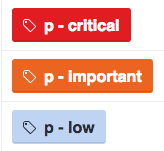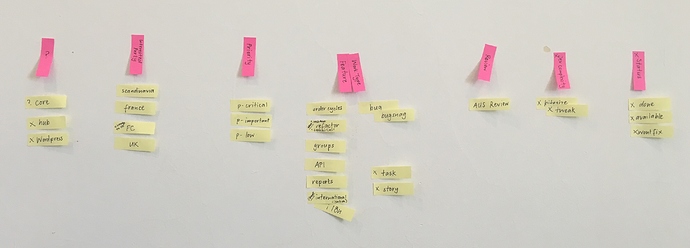The overall goal of this exercise
Is to make it easier to identify, sort, and manage issues within GitHub. And to use the GitHub repository only for identifying and managing changes to the OFN master codebase, and nothing else (all other things like changes to the WordPress site or to the user guides can be managed here).
Part 1 - Labelling
We need to come up with a set of label types and the labels within that type that we can use in GitHub. These labels will work alongside of Milestones and the ZenHub boards (a Chrome & FF GitHub plugin to manage all issues in your milestone as they are done - https://www.zenhub.io/).
View the current list of labels.
Proposed categories and labels
A google spreadsheet has been created with a strawman version of the labels that you can view and comment on.
However, I’ve added some detail here for you to get an understanding of this strawman. If you use GitHub and have some thoughts please add them below. Eventually we’ll have a final version, which we’ll then implement into GitHub.
Type #1 - PRIORITY
This type of label already exists, and is working well.

Critical = highest priority, if a feature/function it must be done ASAP or if a bug fixed immediately (fatal error, direct impact on revenue, high risk).
Important = still fairly high priority, however can be looked at after all critical issues.
Low = not needed, likely to be put into the Icebox milestone as it isn’t important or critical.
Type #2 - STAKEHOLDER
This type of label already exists, and is working well.
It is used to demonstrate who is a particular stakeholder for an issue. An example of this would be the current work being done by Rob on tax issues. The UK and Scandinavia both have a direct interest (either financially or supportively  ) in having this work done, and so those issues should be labelled to demonstrate this.
) in having this work done, and so those issues should be labelled to demonstrate this.
So this means there will be one label per local instance. At the moment the labels of this type that exist are france, scandinavia and the uk, all others can be created if we agree this is needed.
Question for the crowd: is it also worth having labels for enterprises who have a vested interest in issues, such as StroudCo (UK) or FoodConnect (AU)? Is there any value in this?
Type #3 - REVIEW REQUIRED
This type of label already exists, and is working well.
It is used primarily to identify when a code review, or a pull request, or a general review of what has been built (e.g. by Sally, tester extraordinaire) is required of the dev team in Australia (and therefore the label is ‘aus review’. At the moment it’s used as a way to get the team’s attention by the UK team, and it works really well.
Type #4 - FEATURE GROUPING
These types of labels exists to a certain extent, but has some room for improvement.
These labels identify issues as part of a bigger piece of work around a function or a feature (e.g. ‘groups’, ‘order cycles’, ‘API’, ‘reports’, ‘i18n’). They work well to group issues within a subject matter.
Type #5 - ISSUE TYPE
These types of labels exists to a certain extent, but has some room for improvement.
These labels identify issues that are bugs (or to identify those that have been found via bugsnag), or are technical in nature (originally called ‘refactor’, but propose changing this label to be ‘technical’)
Question for the crowd: Is ‘technical’ the right label for all things that don’t fit within a particular feature group or that impact on a number of feature groups (issue example here)? Better way to describe it?
Proposed labels to be deleted
international 
core 
hub
WordPress
task
story
tweak
bitesize
available
done
wontfix
 deleted in Github
deleted in Github
Note: Reasons why are listed in the Google spreadsheet (link above)

